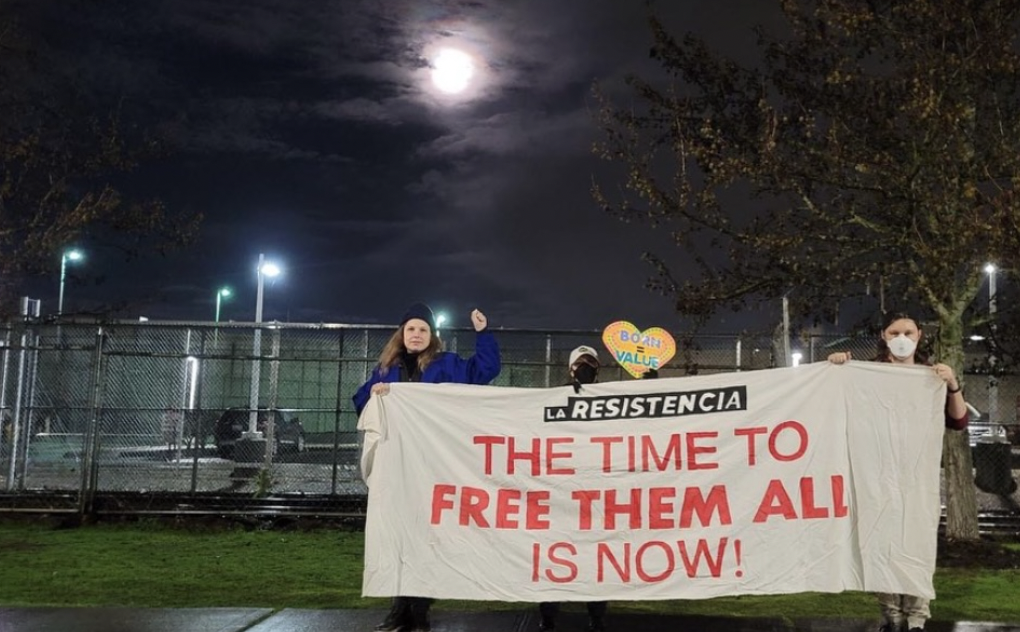
By Grace Farrell
In early November, detainees at the Northwest Detention Center in East Tacoma launched their seventh hunger strike of 2023. The strike lasted for at least 37 days and incorporated more than 100 individuals, which mirrored participation levels from previous hunger strikes at the location.
Several minor strikes have occurred this year, each of which have been covered extensively by La Resistencia, a grassroots organization advocating for detainee rights in the Northwest Detention Center (NWDC).
Detainees are participating in these strikes to protest unhealthy conditions at the NWDC such as unaddressed sanitation hazards and concerns of medical neglect. The center also faces allegations surrounding the usage of intimidation tactics and sexual abuse against detainees, though it’s unclear how widespread these reports are, according to the Washington Center for Human Rights. PBS cites at least 300 reports that have been filed by detainees protesting a variety of human rights violations at this location.
NWDC is a privately-owned institution operated under U.S. Immigration and Customs Enforcement (ICE) and is able to circumvent city regulations that would otherwise oversee the site itself. The NWDC sits beside a liquid natural gas plant and is purposefully concealed from the Tacoma public in a less residential community; a man-made hill even blocks the site from I-5, garnering as little attention as possible. The Washington Center for Human Rights has described the center, the largest of its kind in the state, as upholding a “cycle of cruelty.”
Many former detainees report that tactics such as solitary confinement are frequently used in the center. Research from the Vera Institute shows that solitary confinement exacerbates mental illness, but doesn’t necessarily reduce instances of misconduct or violence. For this reason, it’s widely considered a harmful practice. Beyond the use of official punishments, intimidation tactics to threaten detainees at the center are often reported. Hunger strikes and internal protests have been answered with tear gas, some instances of which have been documented with video footage in recent months.
Despite the risk, it remains unclear if protests by detainees have significantly improved living conditions inside the center. Individuals and organizations outside the center, including some from the University of Puget Sound, aim to advocate for them.
Nola Thury ‘22 shares they became involved in protest efforts through Advocates for Detained Voices, a club previously active on campus. Thury describes the club as a unique vehicle to “leverage whiteness” and its intrinsic privilege to advocate for immigrant justice. Those in the club demonstrated their support by attending events organized by immigrant advocacy groups in Tacoma. One such organization, La Resistencia, remains at the forefront of this advocacy.
La Resistencia was founded in 2014 as participants began to assist with the first NWDC hunger strike under the national umbrella of the #not1more campaign for detainee rights. They continue to organize rallies, attend conferences, and more to fulfill their mission of “working to free people detained by ICE,” according to their website. Despite having such a presence in immigrant activism in the local community, the La Resistencia is led by only four members.
Rufinas Reyes, the organization’s director, described conditions in the center as being awful. She keeps in contact with many of the detainees who can file reports of neglectful conditions to La Resistencia, in hopes that they’ll be able to advocate for the detainees and spread awareness about the center’s brutal practices. Reyes describes a recent example of this: “there have been many complaints of area flooding” as well as “extreme temperature conditions and no ventilation,” which contribute to the spread of illness in the center, especially in harsh winter weather. Reyes explains that detainees must deal with these conditions without complaint, or they are threatened with isolation and other punishments.
While she gladly files these reports issued against NWDC, Reyes worries that the method required for contacting detainees exposes them to privacy violations. She explains that for contacting those inside, NWDC must collect the “name and number of the detained person,” which could endanger those that “aren’t citizens but want to communicate with a family member.” Reyes posits that ICE, who runs the center, may be collecting this information to go after more individuals that can be placed in these centers.
Despite these concerns, Reyes and her colleagues are determined to keep pressing for better conditions on behalf of detainees. Another facet of their organization involves environmental advocacy because of NWDC’s close proximity to the natural gas plant, given concerns of chemical exposure for detainees. La Resistencia wants to “collaborate with other organizations in Tacoma” to help solve these issues, Reyes says.
Continued protests and even advocacy for new regulatory legislation aims to alleviate environmental and human rights concerns perpetrated by the center. Most recently, La Resistencia endorsed Law HB 1470, necessitating surprise visits by health inspectors to NWDC to evaluate conditions and hold those in power accountable for any unsanitary conditions observed. Department of Labor and Industries officials have attempted to investigate the center under the author of HB 1470, but they continue to be denied entry for inspections. GEO Group, a company running the NWDC facility, is also suing the state over HB 1470 and argues that the law is unconstitutional because it interferes with federal immigration policies.
To help advocate for the implementation of this legislation and for other solution-oriented tasks, La Resistencia encourages Puget Sound students to get involved with immigrant rights advocacy. Attending events organized by the group demonstrates public support for the cause and encourages others to educate themselves on immigrant justice issues, similar to what Thury and countless others have done during their time at college.
“People have always resisted and found ways to challenge injustice,” Thury says. “It’s really empowering to be a part of it.”
